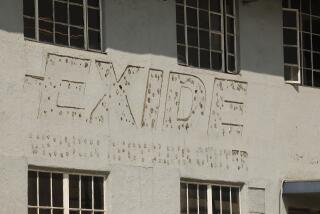IRS investigates $419-million Vernon bond deal
The Internal Revenue Service is auditing more than $400 million in tax-exempt bonds issued by the city of Vernon in 2009, marking the third major investigation of the troubled city in the past year.
The IRS notified the city this month that it had obtained information that “causes a concern that the debt issuance may fail one or more provisions” of the Internal Revenue Code, according to a document released by the city. The IRS declined to comment, and city officials said they haven’t been briefed on the probe’s specifics.
The investigation comes as Vernon faces possible disincorporation by the state Legislature after a series of scandals. Three top officials have been convicted of public corruption in recent years.
The Los Angeles Times reported this month about large financial losses Vernon suffered in a series of aggressive investments in its power business. Between 2005 and 2010, the city reported a $130-million loss in net assets and amassed nearly half a billion dollars in debt.
Attorneys and experts interviewed by The Times said the IRS audit could be costly for Vernon. They said the probe probably focuses on whether the city’s use of bond proceeds violated restrictions on tax-exempt debt. If the bonds are deemed taxable, the government could demand millions of dollars in unpaid taxes.
Federal law allows local governments to issue tax-exempt bonds for certain types of “qualified purposes,” such as major construction projects and infrastructure improvements. The $419 million in bonds Vernon issued in 2009 were used to help pay for a 15-year supply of natural gas the city had acquired three years earlier.
Perry Israel, a tax attorney based in Sacramento, said the wording of the notification Vernon received from the IRS indicates that it had been targeted by the agency, not selected at random.
“These ‘red flag’ letters are fairly uncommon,” he said. “It means the IRS has been looking at something, and they think there’s a significant issue.”
Glenn Byers, Los Angeles County’s assistant treasurer, said it is unusual for a municipality’s bonds to be subjected to an audit triggered by an external source or complaint. He said that to his knowledge, L.A. County has never had a bond issuance audited by the IRS.
Vernon officials said they are fully cooperating with the audit and do not believe that any violations occurred.
“There’s no reason to think there’s anything wrong with the deal,” said Larry Sobel, an attorney representing Vernon in the audit. “My own guess is that once the IRS looks at it, they’re going to say it was a pretty standard refunding.”
Despite its small population — only about 100 people live in the city — Vernon’s government has an operating budget of more than $300 million. Most of its revenue comes from the Light & Power Department, which sells electricity to about 1,800 companies in the city.
The utility issued more than $1 billion in bonds between 2003 and 2009 to finance the construction of a power plant and to purchase fuel to operate it. At the center of the deals was Eric T. Fresch, a former city attorney and city administrator who made as much as $1.65 million in annual compensation.
In 2006, Vernon issued $431 million in tax-exempt bonds to buy a 15-year supply of natural gas for its new power plant. Three-fourths of the gas was bought at a fixed rate of $7.50 per unit. At the time, the purchase was considered one of the first of its kind, Sobel said.
The city has suffered significant losses on the deal. Natural gas prices, which had surged above $10 a unit in 2006, have since fallen as low as $3. And the derivative trades Vernon used to try to lower its interest rates backfired after the financial meltdown of 2008.
That year, as its losses mounted, Vernon sold the power plant to a private company along with some of its transmission assets.
But the city still has to pay for the gas. It now resells the fuel to another utility.
Most of the proceeds from the 2009 bonds, which the IRS is examining, were used to redeem the outstanding debt on the original natural gas purchase, Sobel said. He compared the 2009 issuance to a refinancing of a home mortgage.
Sobel’s law firm, Orrick, Herrington & Sutcliffe LLP, served as bond counsel on both issuances. Since 2005, the firm has received about $2 million in fees from the city, records show.
Vernon has also worked closely with Bond Logistix, a subsidiary of the law firm that provides financial advisory services. A lucrative agreement between Vernon and Bond Logistix was recently criticized by the city’s ethics advisor because it allows the firm to raise its rates without the City Council’s consent.
Vernon has given Fresch, who is now a city consultant, permission to work for Bond Logistix. Neither Fresch nor the firm has said whether he actually works there.
Israel and other attorneys interviewed said it’s unlikely the IRS would focus on individuals involved in the deals. They expect the agency will examine the specific structure of the natural gas purchase to determine whether it qualifies as a tax-exempt project.
“The prepaid contracts area is evolving; it’s very sophisticated and very new,” said Donald Hunt, a public finance lawyer based in Los Angeles. “It doesn’t surprise me that the IRS would want to look at it.”
If the IRS concludes that Vernon’s project does not qualify, it would have the option to collect tax on the interest payments received by the city’s bondholders, Israel said. Such an action would probably spark a series of lawsuits against the city.
Because of the difficulties involved in that process, a direct settlement between Vernon and the IRS would be a more likely outcome, Israel said.
“This could end up being pretty expensive for the city,” he said.
More to Read
Sign up for Essential California
The most important California stories and recommendations in your inbox every morning.
You may occasionally receive promotional content from the Los Angeles Times.











